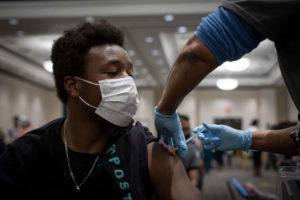Ontario to unveil updated COVID-19 modelling as 2nd doses of COVID-19 vaccines accelerated for some

Some Ontarians who live in one of seven regions where the delta variant of concern is spreading will be able to book a second dose of COVID-19 vaccine earlier than scheduled, the province said Thursday.
Peel’s top doctor warns ‘potential 4th wave’ of COVID-19 brewing due to delta variant
As of Monday, those who got a first shot of an mRNA vaccine on or before May 9, and live in one of the following public health units, can start trying to get a second shot:
- Toronto
- Peel Region
- York Region
- Halton Region
- Waterloo Region
- Wellington-Dufferin-Guelph
- Porcupine
Eligible residents can book through the province’s central system, through their local public health unit (depending on where they live) or at a participating pharmacy, officials said during a media briefing today.
At a news conference, Solicitor General Sylvia Jones said Ontario is making “tremendous progress” on the vaccination front.
“We can all be proud of the progress being made, together,” she said.
The so-called “delta strategy” comes amid growing calls from some public health experts for Ontario to allocate an increased percentage of available vaccine doses to areas where the variant is spreading.
Earlier in the vaccine rollout, the province sent more doses to 114 hot spots that were designated based on historical data. The revised strategy takes a different approach, officials said, with prevalence of the delta variant being the key factor.
The health units eligible for accelerated second doses could therefore change over time, depending on the spread of this variant, officials added.
Moreover, delta areas of concern will not necessarily receive any more vaccine doses than they currently are, though if those health units are using all of their available doses the province will work them individually to potentially arrange for greater supply, officials said.
The delta variant, first identified in India, is likely more transmissible than previous strains and could come with a higher risk of severe illness and death. First doses of currently available vaccines in Ontario are only between 33 and 55 per cent effective in preventing illness from the variant, preliminary research suggests.
Officials also said that starting the week of June 20, mobile workplace clinics in Toronto, Peel and York, as well as employer-led clinics in Peel specifically, will begin operating sooner than expected.
No change to time between doses for AstraZeneca
Notably absent from today’s briefing were any changes to the second-dose interval for those who got a first shot of the AstraZeneca vaccine. Right now, Ontarians in that group must wait at least 12 weeks between shots, whether they opt for a second dose of AstraZeneca or an mRNA vaccine like Pfizer and Moderna.
That policy will remain in place for the time being, officials said.
Earlier this week, a member of Ontario’s COVID-19 vaccine task force told CBC News he believes the interval should be shortened to get more people fully vaccinated.
“I would have thought that we could shrink that duration of time, as well, for those who received a first shot of AstraZeneca, regardless of whether they want a second dose of AstraZeneca or a second dose of an mRNA vaccine,” Dr. Isaac Bogoch, an infectious disease specialist and member of Ontario’s vaccine task force, told CBC News.
“That hasn’t happened yet — I would hope that that would happen.”
At the briefing, officials said there is not enough real-world data available yet to know how shortening the interval could impact the efficacy of the vaccine schedule, despite other provinces already offering second doses sooner to residents who received the AstraZeneca vaccine.
Health Minister Christine Elliott said Thursday that “the evidence to date” suggests 12 weeks is the best interval window.
“That is the gold standard, but it is being studied,” Elliott said.
Also announced at the briefing, Ontarians who received one or two doses of vaccine out-of-province or internationally can register with their local public health units to have their immunization verified and put into the COVAX tracking system, which produces an Ontario vaccination receipt.
590 new cases
Meanwhile, Ontario reported another 590 cases of COVID-19 and the deaths of 11 more people with the illness this morning.
Today’s case count is up from recent days but well below last Thursday’s total of 870. Because testing in Ontario is cyclical, its best to compare the same days of the week.
Labs completed more than 31,000 tests and Public Health Ontario logged a provincewide positivity rate of 2 per cent for a second consecutive day. Positivity rates continue to decline week over week.
The seven-day average of daily cases fell to 617, its lowest point since Oct. 7, 2020.
The additional deaths pushed the official toll to 8,931.
Meanwhile, public health units collectively administered 182,350 more doses of COVID-19 vaccines yesterday, the most on a Wednesday so far and the second-most on a single day. The province is now averaging more than 160,000 shots per day.
About 62.6 per cent of Ontarians, or 73.2 per cent of those aged 18 and older, have now had at least one shot. Eleven per cent of the total population are fully vaccinated.
Today’s figures come on the eve of most of Ontario moving into the initial phase of its reopening plan.
As of 12:01 a.m. Friday, restrictions on certain kinds of outdoor gatherings, patio dining and retail will be loosened. The province will spend 21 days in Phase 1 before moving forward, as long as key COVID-19 indicators trend in the right direction and vaccine progress continues.
One health unit, however, will remain in shutdown conditions. Porcupine Health Unit has over 300 active cases and has said it will order that doors stay closed in Timmins, Kapuskasing, Hearst, Cochrane, Iroquois Falls and in the remote communities of the James Bay Coast.








Redes Sociais - Comentários